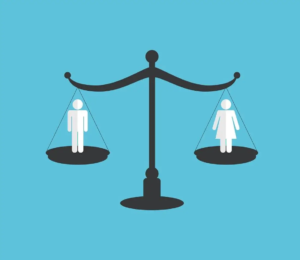
Right to Equality

One of the six fundamental rights according to the Indian constitution is the right to equality which includes in itself equality before the law, and prohibition of discrimination on grounds of race, religion, gender, and caste.
Right to equality is a landscape view that defines India’s democratic and secular framework, an assurance is provided to every citizen by providing equal opportunities and protection against discrimination. It is rooted in the principles of justice, liberty, and fraternity which form the basis of our constitution.
Right to equality is defined under Article 14 of the constitution which illustrates that “the state shall not deny to any person equality before the law or the equal protection of the laws within the territory of India.”It is an important right that ensures that every citizen in India is fairly treated without any discrimination.
Article 15 of the Right to Equality:

Article 15 of the Indian Constitution of 1950 contains prohibition discrimination based on religion, race, caste, sex, or place of birth. The prohibition of the state from doing discrimination against these grounds and possible insurance of giving equal access to public places, for example- places of worship or restaurants, etc.
Discrimination based on gender is a significant blockage to the system of right to equality in India. Despite different provisions and laws women in India are being. Discrimination in many areas such as education, employment, and access to justice.
There are several steps taken for the empowerment of women but more needs to be done for the entirety of gender equality. Another discrimination faced by Indian society based on the right to equality is discrimination based on caste.

This system has been part of Indian society now for the past few centuries with the appearance of many provisions and different laws discrimination based on caste still exists. The affirmative action program is one of the combative steps taken by the Indian government for the eradication of such faced discrimination.
Various enactments are made for the promotion of laws and the protection of the right to equality in Indian society. These are the Scheduled Caste and Scheduled Tribes (Prevention of Atrocities) Act, of 1989, the Protection of Civil Rights Act, of 1955, and the Right to Education Act, of 2009.
Despite these legal and policy frameworks, discrimination continues to be a pervasive problem in India. Caste discrimination, in particular, remains a significant challenge, with millions of people facing discrimination and exclusion based on their caste.
Women and girls also face discrimination in many areas of life, including access to education, employment, and healthcare. Discrimination based on religion, ethnicity, and sexual orientation is also a concern in India.
The Indian government has taken several steps to address these challenges. For example, the government has implemented affirmative action programs, such as reservations in education and employment, for members of disadvantaged groups. The government has also launched several campaigns and initiatives to raise awareness about discrimination and promote social inclusion.
However, there is still a long way to go in the fight against discrimination in India. Many of the existing legal frameworks and policies are not effectively implemented, and social attitudes toward discrimination remain deeply entrenched. There is a need for more comprehensive and effective legal and policy frameworks, as well as greater efforts to change social attitudes and promote social inclusion.
Article 16 of the Indian Constitution guarantees equality of opportunity in matters of public employment. The article prohibits discrimination based on religion, race, caste, sex, descent, place of birth, or residence, in respect of any employment or office under the State.
The provisions of Article 16 aim to ensure that all citizens have an equal opportunity to access public employment and that discrimination based on certain grounds is prohibited. The provision for reservation of appointments or posts in favour of backward classes of citizens is aimed at providing affirmative action to ensure that historically disadvantaged groups have access to public employment and are adequately represented in the services under the State.
Article 17 of the Indian Constitution is one of the most important provisions for promoting equality in India. It deals with the issue of untouchability, which is a form of discrimination that has been prevalent in Indian society for centuries.
Untouchability refers to the practice of social discrimination against people who are considered to be from lower castes or outcastes, who are historically excluded from social, religious, and cultural activities. Article 17 of the Indian Constitution specifically prohibits the practice of untouchability and makes it a punishable offence.
However, despite the legal provisions, discrimination is still prevalent in Indian society. The caste system and religious divisions continue to create inequalities and injustices. Women still face discrimination and violence in their daily lives. Marginalized communities such as
Dalits, Adivasis, and Muslims often face discrimination and exclusion from mainstream society.
To ensure that the right to equality is upheld, it is essential to create awareness among people and promote a culture of inclusion and respect for diversity. The government needs to implement policies and programs that promote equality and address the root causes of discrimination. Education and awareness campaigns can help change people’s attitudes and perceptions and promote a more inclusive and equal society.
In conclusion, the right to equality is a fundamental human right that is essential for the development and progress of any society. While India has made significant progress in protecting this right, there is still a long way to go. By promoting awareness, implementing
policies, and addressing the root causes of discrimination, India can move towards a more just and equal society where every citizen has an equal opportunity to succeed. the basis of religion, race, caste, sex, or place of birth. The prohibition of the state from doing discrimination against these grounds and possible insurance of giving equal access to public places, for example- places of worship or restaurants, etc.







